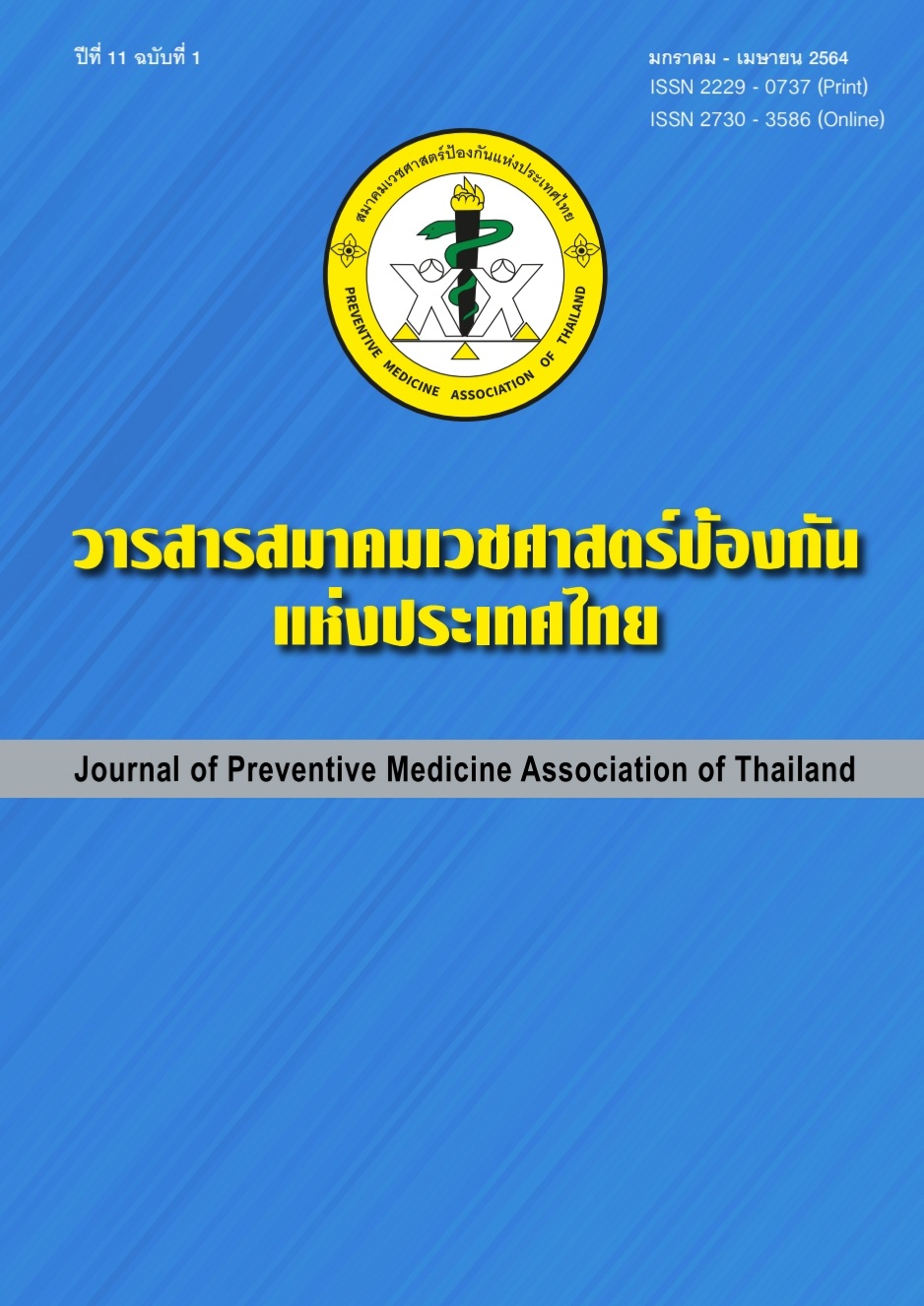Factors Associated with Sexually Transmitted Infection of Patients in Primary Care Unit
Keywords:
Sexually transmitted infection, Primary CareAbstract
Rising cases of sexually transmitted diseases in Thailand have been increasing at a rapid rate and its condition has caused public health problems, not only in Thailand but also the whole world concern. Studies have shown some contradiction of factors related to sexually transmitted infections and also found zero research from the primary care unit In Phra Nakhon Si Ayutthaya. The purpose of this research is to study factors related to sexual infections of 140 patients in Primary Care by dividing them into 47 people with sexually transmitted infections and 93 non-infected people. The data collection method is interviewing a random group of people from June to October 2020. An interview has included related factors, patient history, personal characteristics, sexual behavior, and sexually transmitted disease. Data analysis of descriptive statistics has included percentage, average, standard deviation, and analytic statistic such as Independent t-test, Chi-square test. The results will be analyzed by Binary Logistic Regression to delineate Multivariate analysis. Researchers have found that major factors related to sexually transmitted infection is patient with sexual infection history and 46.8 percent are Gonococcal infection. In conclusion, the factor associated with sexually transmitted infection was having a previous history of sexually transmitted infection and the factor of personal data was age less than 44 years.
References
Centers for Disease Control and Prevention. Sexually transmitted infections (STIs) [Internet]. 2016 [cited 2020 February 10]. Available from https://www.cdc.gov/std/general/default.htm.
World Health Organization. Sexually transmitted infections (STIs) [Internet]. 2019 [cited 2020 February 10]. Available from:https://www.who.int/news-room/fact-sheets/detail/sexually-transmitted-infections-(stis).
นิสิต คงเกริกเกียรติ, รสพร กิตติเยาวมาลย์, เอกชัย แดงสอาด, บรรณาธิการ. แนวทางการดูแลรักษาโรคติดต่อทางเพศสัมพันธ์ พ.ศ.2558. นนทบุรี: กรมควบคุมโรค; 2558.
กองยุทธศาสตรและแผนงาน สำนักงานปลัดกระทรวงสาธารณสุข. สถิติสาธารณสุข พ.ศ. 2560 [อินเทอร์เน็ต]. 2561 [เข้าถึงเมื่อ 2 มี.ค.2564]. เข้าถึงได้จาก: http://www.pcko.moph.go.th/Health-Statistics/stratistics60.pdf
นุชนารถ แก้วดำเกิง, จิตรา อ่อนน้อม, สิริพร ภิยโยทัย, จุฑามาศ มากกุญชร, ภัทร์ศยา มุกลีมาศ, ศิริกูล ชัยเจริญ และคณะ. คู่มือการสร้างเสริมความรอบรู้ด้านเอชไอวีและโรคติดต่อทางเพศสัมพันธ์ (HIV & STIs Literacy). นนทบุรี: กรมควบคุมโรค; 2563.
ศุภดิษฐ์ บาริศรี, ดุสิต สุจิรารัตน์, มธุรส ทิพยมงคลกุล. การศึกษาความชุกและปัจจัยที่มีส่วนสัมพันธ์กับโรคติดต่อทางเพศสัมพันธ์ (คลาไมเดีย ทราโคมาทิส, ไนซีเรีย โกโนเรีย และซิฟิลิส) ในกลุ่มชายรักชายและกลุ่มชายข้ามเพศบางจังหวัดในประเทศไทย. วารสารการประชุมวิชาการสาธารณสุขแห่งชาติ 2561;16:275-83.
Kent CK, Chaw JK, Wong W, Liska S, Gibson S, Hubbard G, et al. Prevalence of Rectal, Urethral, and Pharyngeal Chlamydia and Gonorrhea Detected in 2 Clinical Settings among Men Who Have Sex with Men: San Francisco, California, 2003. Clin Infect Dis 2005;41: 67-74.
พรรณนิภา สังข์ทอง. การศึกษาพฤติกรรมเสี่ยงต่อการติดโรคติดเชื้อทางเพศสัมพันธ์และโรคเอดส์ของผู้ชายที่เข้ามาตรวจรักษาโรค [วิทยานิพนธ์ปริญญาวิทยาศาสตรมหาบัณฑิต]. กรุงเทพฯ: จุฬาลงกรณ์มหาวิทยาลัย; 2549.
พอเพ็ญ ไกรนรา. ความรู้เกี่ยวกับการป้องกันโรคติดต่อทางเพศสัมพันธ์และการป้องกันการตั้งครรภ์ของนักเรียนระดับมัธยมศึกษาในโรงเรียนสังกัดเทศบาลเมืองสระบุรี. วารสารศูนย์การศึกษาแพทยศาสตร์คลินิก โรงพยาบาลพระปกเกล้า 2556;30:274-86.
Jung M. Risk factors of sexually transmitted infections among female sex workers in Republic of Korea. Infect Dis Poverty 2019;8:6
พนิดา กัณหากุล, ชลลดา อยู่ศิริ, สุดาพร ปุจฉากาญจน์. สถานการณ์โรคหนองในของผู้รับบริการในคลินิกตรวจรักษาโรคติดต่อทางเพศสัมพันธ์โรงพยาบาลเลย (พ.ศ.2556–2558). วารสารสำนักงานป้องกันควบคุมโรคที่ 7 ขอนแก่น. 2560;24:38-45.
Behets F, Andriamiadana J, Rasamilalao D, Ratsimbazafy N, Randrianasolo D, Dallabetta G, et al. Sexually transmitted infections and associated socio-demographic and behavioural factors in women seeking primary care suggest Madagascar’s vulnerability to rapid HIV spread. Trop Med Int Health 2001;6:202–11.
Mayer KH, Bush T, Henry K, Overton ET, Hammer J, Richardson J, et al. Ongoing Sexually Transmitted Disease Acquisition and Risk-Taking Behavior Among US HIV-Infected Patients in Primary Care: Implications for Prevention Interventions. Sexually Transmitted Diseases 2012;39:1–7.
กองระบาดวิทยา กรมควบคุมโรค. Reported cases and deaths by Province and by Month Thailand 2020 [อินเทอร์เน็ต]. 2563 [เข้าถึงเมื่อ 3 มี.ค. 2563]. เข้าถึงได้จาก: http://www.boe.moph.go.th/boedb/surdata/index.php.
Bernard R. Fundamentals of biostatistics 5th ed. Duxbery: Thomson learning; 2000.
Fleiss JL, Levin B, Paik MC. Statistical methods for rates and proportions 3rd ed. John Wiley&Sons; 2003.
Ngamjarus C, Chongsuvivatwong V. n4Studies: Sample size and power calculations for iOS. Songkla: Program - The Thailand Research Fund&Prince of Songkla University; 2014.
กุลภัสสรณ์ ศิริมนัสสกุล. รายงานการศึกษาสถานการณ์โรคติดต่อทางเพศสัมพันธ์ด้านระบาดวิทยาและเคราะห์ผู้มีส่วนเกี่ยวข้องเพื่อส่งเสริมให้การดำเนินงานบรรลุความสำเร็จต่อการลดโรคติดต่อทางเพศสัมพันธ์. นนทบุรี: กรมควบคุมโรค; 2560.
สุรชัย ล้ำเลิศกิตติกุล. โรคติดเชื้อทางเพศสัมพันธ์ [อินเทอร์เน็ต]. 2562 [เข้าถึงเมื่อ 15 ธ.ค.2563]. เข้าถึงได้จาก: http://www.chularat304inter.com/news_detail.php?id=183
MedThai. หนองใน อาการ สาเหตุ และการรักษาโรคหนองในแท้ 6 วิธี [อินเทอร์เน็ต]. 2560 [เข้าถึงเมื่อ 15 ธ.ค.2563]. เข้าถึงได้จาก: https://medthai.com
World health organization. Q&A – How can I drink alcohol safely?[Internet]. 2020 [cited 2020 Dec 15]. Available from:https://www.euro.who.int/en/health-topics/disease-prevention/alcohol-use/data-and-statistics/q-and-a-how-can-i-drink-alcohol-safely
พิสุทธิ์ พงษ์ชัยกุล. การดื่มเหล้า ส่งผลต่ออวัยวะในร่างกายและกระทบต่อสังคมอย่างไรบ้าง? [อินเทอร์เน็ต]. 2563 [เข้าถึงเมื่อ 15 ธ.ค.2563]. เข้าถึงได้จาก: https://hd.co.th/alcohol-dosage-and-how-not-to-harm-yourselves-and-others
Downloads
Published
How to Cite
Issue
Section
License
บทความที่ลงพิมพ์ในวารสารเวชศาสตร์ป้องกันแห่งประเทศไทย ถือเป็นผลงานวิชาการ งานวิจัย วิเคราะห์ วิจารณ์ เป็นความเห็นส่วนตัวของผู้นิพนธ์ กองบรรณาธิการไม่จำเป็นต้องเห็นด้วยเสมอไปและผู้นิพนธ์จะต้องรับผิดชอบต่อบทความของตนเอง






